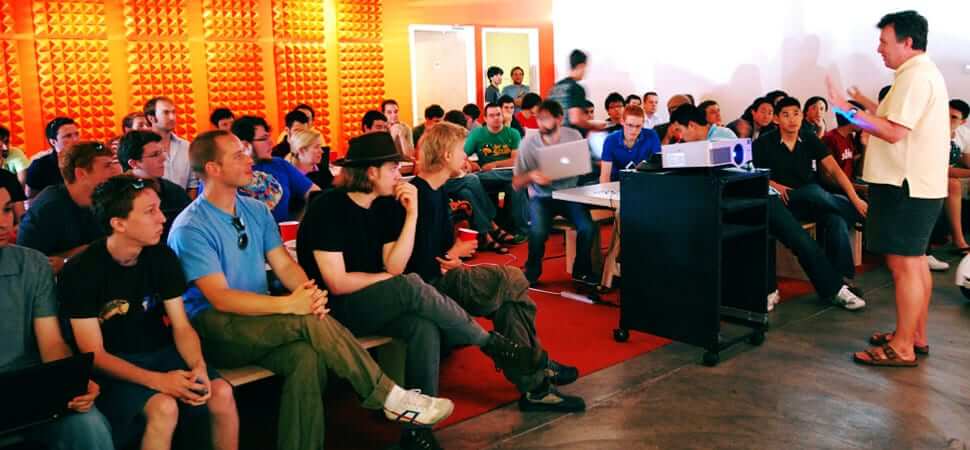Paul Graham is the co-founder of Y-Combinator, the most renowned seed acelerator in the world. Via his work he has been exposed to countless of startups, allowing him to gain important insights. In essence his argument is that much about running a startup is counterintuitive to what peopel have learned to that point in more formal structures – here is the Broadstuff Expergated Version for you lazy lot out there:
1. Don’t saddle yourself from the get-go
Trust your instincts about people….one of the most common mistakes young founders make is not to do that enough. They get involved with people who seem impressive, but about whom they feel some misgivings personally. If you’re thinking about getting involved with someone—as a cofounder, an employee, an investor, or an acquirer—and you have misgivings about them, trust your gut. If someone seems slippery, or bogus, or a jerk, don’t ignore it.
2. Its all about the Customer
The way to succeed in a startup is not to be an expert on startups, but to be an expert on your users and the problem you’re solving for them. [T]he characteristic mistakes of young founders is to go through the motions of starting a startup. They make up some plausible-sounding idea, raise money at a good valuation, rent a cool office, hire a bunch of people. From the outside that seems like what startups do. But the next step after rent a cool office and hire a bunch of people is: gradually realize how completely fucked they are, because while imitating all the outward forms of a startup they have neglected the one thing that’s actually essential: making something people want.
3. You can’t game the startup system
The third counterintuitive thing to remember about startups: starting a startup is where gaming the system stops working. Gaming the system may continue to work if you go to work for a big company. Depending on how broken the company is, you can succeed by sucking up to the right people, giving the impression of productivity, and so on. But that doesn’t work with startups. There is no boss to trick, only users, and all users care about is whether your product does what they want. Startups are as impersonal as physics. You have to make something people want, and you prosper only to the extent you do.
Though he makes the caveat:
The dangerous thing is, faking does work to some degree on investors. If you’re super good at sounding like you know what you’re talking about, you can fool investors for at least one and perhaps even two rounds of funding. But it’s not in your interest to. The company is ultimately doomed. All you’re doing is wasting your own time riding it down.
4. A startup is for life, not for Christmas
Startups are all-consuming. If you start a startup, it will take over your life to a degree you cannot imagine. And if your startup succeeds, it will take over your life for a long time: for several years at the very least, maybe for a decade, maybe for the rest of your working life. So there is a real opportunity cost here.
And as for starting up while at Uni, its one thing or the other. It may have worked for Zuckerberg & Gates, but they are a smal minority:
Yet when it comes to startups, a lot of people seem to think they’re supposed to start them while they’re still in college. Are you crazy?
Graham’s view on what to dio at Uni is this:
…if you want to be a successful startup founder is not some sort of new, vocational version of college focused on “entrepreneurship.” It’s the classic version of college as education for its own sake. If you want to start a startup after college, what you should do in college is learn powerful things.
5. How can you tell if you’re up to this challenge?
You can’t tell. Your life so far may have given you some idea what your prospects might be if you tried to become a mathematician, or a professional football player. But unless you’ve had a very strange life you haven’t done much that was like being a startup founder. Starting a startup will change you a lot. So what you’re trying to estimate is not just what you are, but what you could grow into, and who can do that?
6. The way to get startup ideas is not to try to think of startup ideas.
I’ve written a whole essay on this, so I won’t repeat it all here. But the short version is that if you make a conscious effort to think of startup ideas, the ideas you come up with will not merely be bad, but bad and plausible-sounding, meaning you’ll waste a lot of time on them before realizing they’re bad.
The way to come up with good startup ideas is to take a step back. Instead of making a conscious effort to think of startup ideas, turn your mind into the type that startup ideas form in without any conscious effort. In fact, so unconsciously that you don’t even realize at first that they’re startup ideas.
7. How do you know if you are working on Real Stuff ?
I can’t explain in the general case what counts as an interesting problem, I can tell you about a large subset of them. If you think of technology as something that’s spreading like a sort of fractal stain, every moving point on the edge represents an interesting problem. So one guaranteed way to turn your mind into the type that has good startup ideas is to get yourself to the leading edge of some technology—to cause yourself, as Paul Buchheit put it, to “live in the future.” When you reach that point, ideas that will seem to other people uncannily prescient will seem obvious to you. You may not realize they’re startup ideas, but you’ll know they’re something that ought to exist.
8. And the Ultimate Advice?
So here is the ultimate advice for young would-be startup founders, boiled down to two words: just learn.
This article was produced by Alan Patrick, blogger at Broadstuff. see more.





























